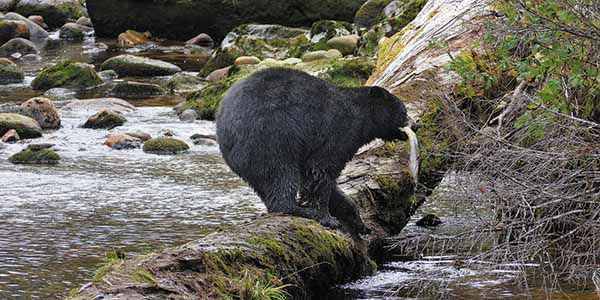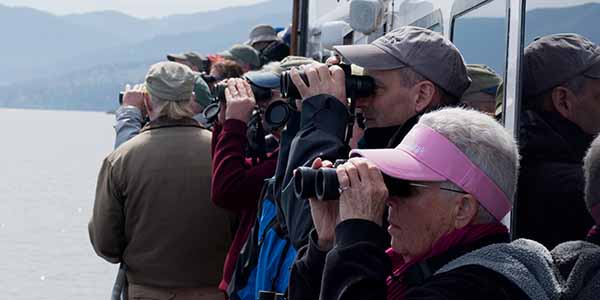Olympic Peninsula
Bounded by the Pacific Ocean to the west, Hood Canal to the east and Strait of Juan de Fuca to the north, the 3,600-square-mile Olympic Peninsula buzzes with magic that few wilderness areas can match. The region’s mystique owes to the temperate rainforest overflowing with emerald moss and misty old-growth trees. The sense of enchantment is fueled by the dramatic sea stacks sprinkled along the rugged coast. The freshest seafood around and delightful communities rich in maritime history have something to do with the vibe, too. Whether you come for a weekend getaway or weeklong adventure, this northwest pocket of the Evergreen State will delight you with its raw landscape and limitless outdoor pursuits.
Highlights of Olympic National Park
Few places hold UNESCO World Heritage and International Biosphere Reserve status, but Olympic National Park, which occupies much of the peninsula’s interior, has managed to pull off both. With glacier-tipped peaks, over 70 miles of coastline and swaths of ancient trees, this natural marvel sets the scene for wild adventures year-round.
Forest Fun
The Hoh Rain Forest is a great place to start your journey. Hike the Hall of Mosses or Spruce Nature trails to uncover an ultralush world teeming with old-growth forests, jade-colored ferns and herds of Roosevelt elk. In search of peace and quiet? Head to the “One Square Inch of Silence,” deemed the quietest place in America by Emmy-winning acoustic ecologist Gordon Hempton.
Heart O’ the Hills
Hurricane Ridge is another bucket list-worthy spot and can be easily reached by driving up the Hurricane Ridge Road. At the top, you’ll come across the Cirque Rim Trail. Follow it to a scenic overlook, where you can take in astounding views of the San Juan Islands and even Vancouver Island on a clear day. The area is also a popular winter sports getaway, so trade your hiking poles for skiing ones when the snow starts to fall.

John Gussman
Home of Big Fish
The fishing in 1,441-square-mile Olympic National Park isn’t just good, it’s extraordinary. Home to 600 lakes and 4,000 miles of fishable waters, this coastal wilderness makes it easy to catch 37 species of native fish. Anglers agree Lake Crescent is the most beautiful place to reel in epic catches. Extremely large and just as deep, this glacial-carved lake boasts phenomenal visibility of up to 60 feet and produces fish often measuring more than 20 inches. Paddle crystal-clear waters to catch and release the Beardslee trout.
Salmon and Cutthroat, Oh My!
Washington’s third-largest natural lake, Lake Ozette supports an abundance of cutthroat trout, while the Hoh River is a hot spot for chinook salmon, coho salmon and steelhead trout. The Elwha River is a renowned fly-fishing destination too, so cast a line to reel in rainbow trout. If you prefer to dig for your dinner, scour the beaches around Hood Canal and Kalaloch for clams.
Rugged Beaches and Deep Forests
There’s a lot of ground to cover and so many diverse landscapes to discover in the Olympic Peninsula. One of the best ways to see almost all of it is by cycling the Olympic Discovery Trail. Spanning 130 miles from Port Townsend to La Push, this year-round bike path shows you the highlights of the North Olympic Peninsula while passing rustic farms, historic towns, serene lakes and dense forest.
Beachcombing
Go from bike to foot and stick your toes in the sand at Ruby Beach on the west coast. At low tide, peek in the tide pools to find starfish and sea snails. Afterward, go for a stroll on the Dungeness Spit on the north coast, the longest natural sand spit in North America. Extending almost 6 miles into the Juan de Fuca Strait, this stretch of sand allows you to get up close to harbor seals while providing awe-inspiring views of the Olympic Mountains. Walk to the very tip to reach the New Dungeness Lighthouse and spot 250 species of birds.
A Flattering Cape
More wildlife can be encountered in Cape Flattery. Located at the peninsula’s northwest end, where the Strait of Juan de Fuca meets the Pacific, this bird-watching paradise serves up views of eagles, falcons and more from four observation decks and a cedar boardwalk.
Coastal Communities
The most populated areas in the Olympic Peninsula are clustered around the northeast and include Sequim, Port Angeles and Port Townsend. Small-town charm is a running theme throughout all of them, with ample maritime history and delicious local fare added to the mix. In Port Angeles, take the Underground Heritage Tour to wander old storefronts and tunnels beneath the surface, and then dine on freshly caught seafood at Kokopelli Grill or the Crab House restaurant. Port Townsend is one of the few Victorian seaports on the National Register of Historic Places, so spend some time exploring its preserved homes and the Jefferson Museum of Art & History.

John Gussman
Twilight Time
Sequim and the Dungeness Valley in the northeast also produce a wide variety of organic produce and artisanal goods that can be sampled at regional festivals and farmers markets. Visiting Forks in the west is a must if you love the “Twilight” series of books and films. The historic timber town was used as the setting for Stephenie Meyer’s best-selling series and welcomes fans with Forever Twilight in Forks, a four-day festival in September featuring actors from the films.
Mark Your Calendar
Port Angeles has been satisfying seafood cravings for almost two decades with the Dungeness Crab & Seafood Festival. Dig into an old-fashioned crab feast at the Crab Central Pavilion, and then check out the chowder cook-off, grab-a-crab derby and cooking demos with famous chefs. Swap crab for shrimp at Hood Canal ShrimpFest. The Memorial Day weekend event dishes out local spot shrimp alongside live music, craft booths and belt sander races. The Juan de Fuca Festival takes place the same weekend in Port Angeles. Four stages host more than a hundred musicians so swing by for great tunes and family-friendly activities.
Lovely Lavender
Sequim’s lavender fields rival those in Provence, France, and you can see them in full bloom at the Lavender Festival every July. The town also hosts the Irrigation Festival, Washington’s oldest continuing festival celebrating the region’s flourishing agricultural industry. The May event promises nonstop fun thanks to a carnival, parade and fireworks shows.
For More Information
Mount St. Helens
360-274-7750
olympicpeninsula.org
Washington Tourism Alliance
800-544-1800
www.experiencewa.com






